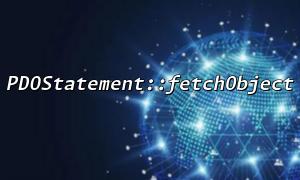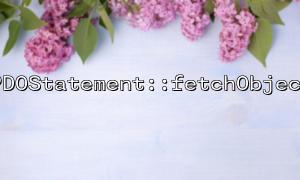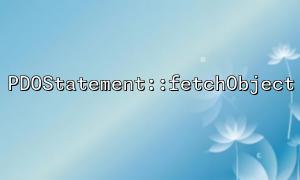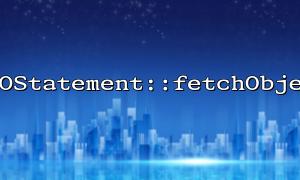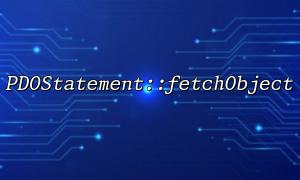In PHP, the PDOStatement::fetchObject method is very commonly used when using PDO (PHP Data Objects) for database operations. It allows us to map database query results to an object. However, in actual development, we usually encounter a requirement: we hope to automatically convert the data type to the appropriate type when obtaining object properties from the database. For example, convert the int type data in the database to an int type attribute, and convert the datetime type to a DateTime object, etc.
This article will explain how to implement this automatic type conversion through PDOStatement::fetchObject .
PDOStatement::fetchObject is a method provided by PDO, which maps each row of the database query result into an object of a specified class. The basic syntax is as follows:
$object = $stmt->fetchObject($className);
$stmt is a statement handle executed through PDO::prepare and PDO::execute .
$className is the class name you want to map to, it can be a custom class or stdClass (i.e. PHP default standard class).
For example:
$stmt = $pdo->query("SELECT * FROM users");
$user = $stmt->fetchObject('User');
In the above code, the query result will be mapped to an object of the User class.
Usually, the data in the database is not returned directly in the type you expect. For example, dates and times in a database are usually of string type, and we want them to be converted to PHP's DateTime objects. Alternatively, integers in the database should be automatically converted to integer types, not strings.
To solve these problems, we can perform automatic type conversion while getting the object.
To implement automatic type conversion, we can take advantage of the magic methods __get and __set in the PHP class. These methods allow us to make custom processing when accessing object properties. We can implement data type conversion through these two methods.
Here is an example of implementing automatic type conversion.
class User
{
private $data = [];
// Used to set attribute values
public function __set($name, $value)
{
$this->data[$name] = $value;
}
// Used to get attribute values,Perform type conversion
public function __get($name)
{
$value = $this->data[$name] ?? null;
// Automatic type conversion
if ($name === 'created_at' || $name === 'updated_at') {
// Convert string to DateTime Object
return new DateTime($value);
}
if ($name === 'age') {
// Convert string to整数
return (int)$value;
}
// If there is no special type conversion,Return to the original value
return $value;
}
}
$pdo = new PDO('mysql:host=gitbox.net;dbname=test', 'root', 'password');
$stmt = $pdo->query("SELECT id, name, created_at, age FROM users");
$stmt->setFetchMode(PDO::FETCH_CLASS, 'User');
$user = $stmt->fetchObject('User');
echo $user->created_at->format('Y-m-d H:i:s'); // The output is automatically converted to DateTime Date of
echo $user->age; // The output is automatically converted to整数的年龄
In the example above, we used __get and __set for simple type conversion. However, more complex type conversions may be required in actual development, such as converting JSON strings to arrays, converting amount fields to floating numbers, etc.
You can extend the __get method as needed, using different conditions and logic to handle various data types. For example:
public function __get($name)
{
$value = $this->data[$name] ?? null;
if ($name === 'preferences') {
// Will JSON Convert strings to arrays
return json_decode($value, true);
}
if ($name === 'price') {
// Convert string to浮动数字
return (float)$value;
}
// Other types of processing
return $value;
}
Through PDOStatement::fetchObject and the magic method in the class, we can easily implement automatic type conversion of database query results. This approach not only simplifies the code, but also ensures consistency of data types in the application. By flexibly using the __get and __set methods, we can customize different type conversion logic according to actual needs.
I hope this article can help you process database query results more efficiently in PHP development and implement automatic type conversion.
Related Tags:
PDOStatement



